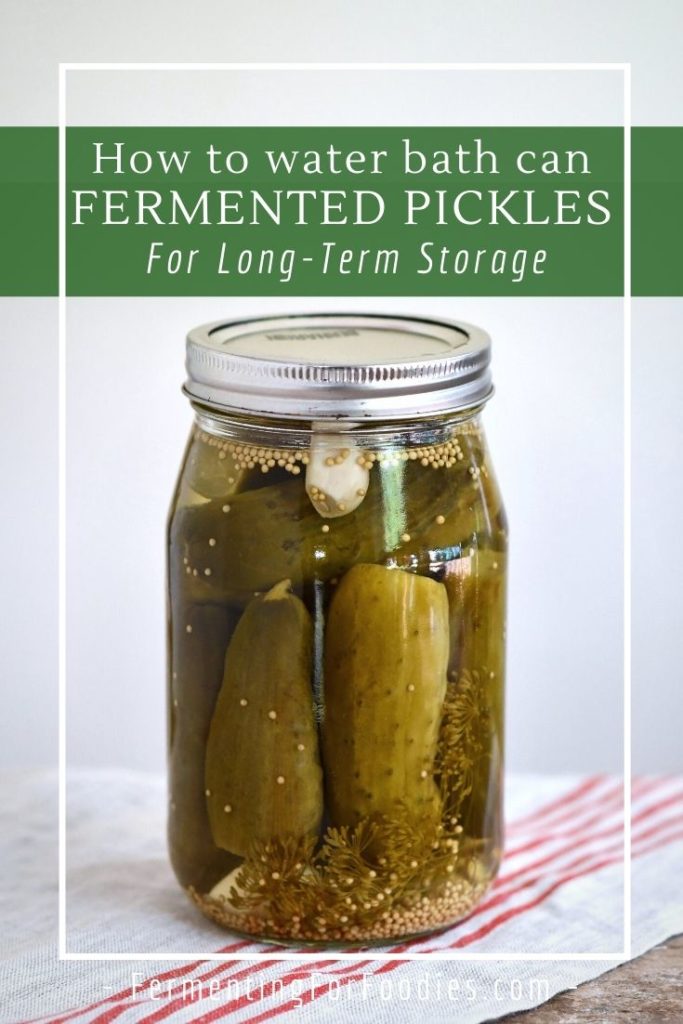
Are you looking for a traditional, deli-style pickle? The secret to that unique and delicious flavor is fermenting! Here’s a simple recipe for fermented pickles that are water-bath canned. Canning fermented pickles is a simple way to preserve these flavorful pickles for long termstorage.
Canning and fermenting?
There are a few different ways of making pickles.
- Vinegar-based pickles are quick and easy. They use the acidity of vinegar as a preservative.
- Storage fermented pickles will last for up to a year in a cool dark location. The secret is to use a good recipe and high-quality jars.
- Salt-brined pickles are a very simple and traditional recipe. While they are often stored for several months without any issues, it is equally common to water bath can salt-brined pickles after fermenting.
This recipe uses a blend of fermenting for flavor, then canning for preservation.
Why Can Fermented Pickles
There are tons of reasons why people can fermented pickles.
- It’s great option for anyone who loves fermented pickle flavor, but isn’t comfortable with leaving pickles to ferment for several months.
- A great option if you only make pickles every few years.
- Perfect for gifts!
- This recipe is really a gardener’s best friend. Just pick the cucumbers as they ripen, and add them to your fermenting crock. Then, water bath can all the pickles at the end of cucumber season.
What about the probiotics?
Unfortunately, canning fermented pickles means that they are no longer probiotic. Canning kills all the microbes (good and bad). However, canned pickles will last in your cupboard for at least 18 months and still have that delicious traditional pickle flavor.
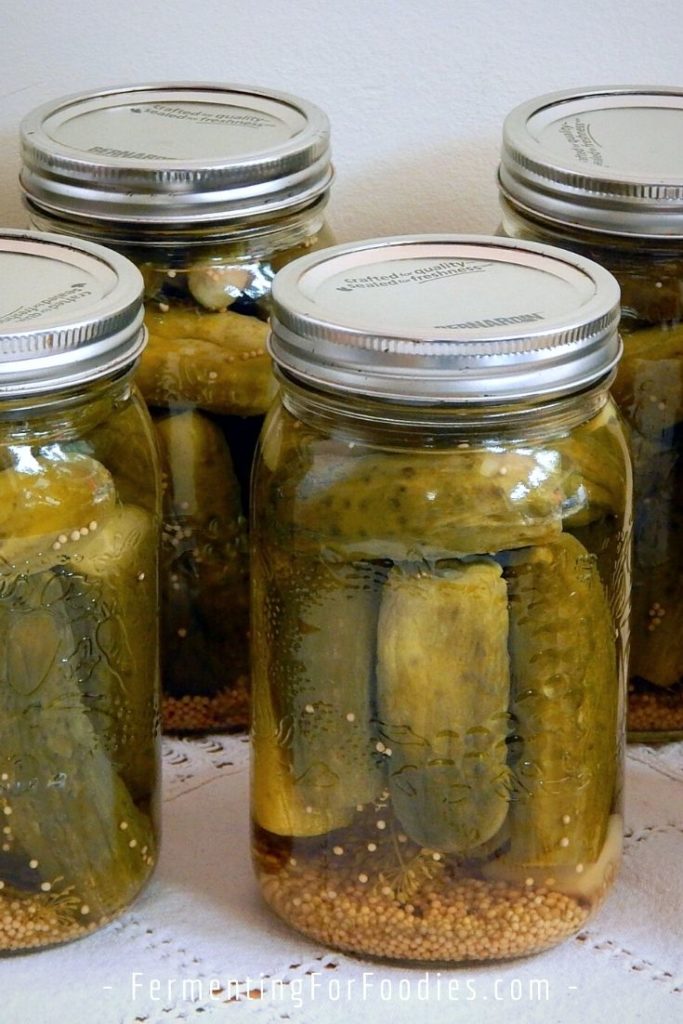
Canning Fermented Pickles
Want to enjoy the flavor of fermented pickles all year long? This recipe involves a quick fermentation for flavor, then uses a boiling water bath canner to preserve the pickles in their brine. These shelf-stable pickles will last in your cupboard for a very long time!
- Prep Time: 20 minutes
- Cook Time: 15 minutes
- Total Time: 35 minutes
- Yield: Approx. 3 quart jars
- Category: Pickles
- Method: Fermented
- Cuisine: Polish
- Diet: Vegan
Ingredients
- 2 lbs pickling cucumbers
- 1 liter (4 cups) of water
- 2 Tbsp white vinegar
- 1/4 cup of non-iodized salt
- 2 dill flowers or sprigs of dill weed
- 4 cloves of garlic
- 2 tsp pickling spices (optional)
- Tannins (see notes)
Instructions
- Wash the cucumbers and trim off the blossom ends. Cut up the larger cucumbers as required.
- Pack cucumbers into a container for fermenting. (See notes for more details).
- If you are fermenting in several jars (rather than 1 large crock), divide the spices between the jars. For example, in a large mason jar, add in 1-2 cloves of garlic, 1 sprig of dill, and 1 tsp of pickling spice.
- Combine water, vinegar and salt to make a brine.
- Pour the brine over the cucumbers.
- Allow to ferment somewhere cool and dark for 2-3 weeks. If you are open air-fermenting (see notes) check the pickles every 2-3 days, and skim off the foam/scum and top up the brine as needed. The pickles are finished when they have changed from bright green to dull green and have a delicious fermented flavor.
- Remove the pickles from the brine. Then strain the brine into a small pot, discarding the dill, spices and garlic.
- Pack the pickles into canning jars.
- Bring the strained brine to a boil and pour over the pickles, leaving 1/2 inch headspace.
- Using snap lids, process the jars in a boiling water canner (10 minutes for 500 mL (pint) jars and 15 minutes for 1 L (quart) jars).
Notes
- Tannins: Pickles will become soft and mushy over time. While removing the blossom end helps, you can also add a source of tannins like a grape leaf, 2 Tbsp of grated horseradish root, or a pinch of black tea.
- Jars: You can find more information on the different containers that can be used for fermenting pickles here.
- Water bath canning: If this is your first time canning, check out this post for more information.
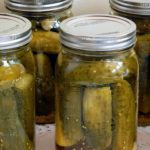
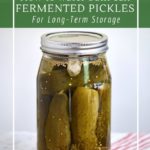
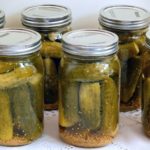
I am considering making the Honey Garlic Pickles, similar to a bread and butter pickle from what I read and would like to do the long term storage. So I assume I would do the recipe as stated for that particular pickle and then follow the steps here from step 7 for storing long term? Is that correct? Thank you.
Yes, the honey garlic pickle is my version of bread and butter. 🙂 Another way to can a fermented b&B pickle is to ferment as described in this recipe, then can it with a standard bread and butter brine. Either should work nicely!
I am thrilled to get this recipe! Even after killing the probiotics after canning them, the dead ones are still beneficial to your body. I found that out after doing much research. An old timer also said they would add pickles daily to the fermented ones, and after a few months can them. She said the crock was so large a cild could take a bath in the crock. It was that large. Anyway excited to get this! Thank you!!!
That is a great piece of advice!
I dont think this is fermenting at all, not one bit. the vinegar kills everything and dead bacteria do not ferment, so it’s a vinegar pickle canned recipe. I was expecting brine only fermentation, THEN canning with new vinegar juice or even the old juice.
This is one traditional method of making pickles. If you would like a pickle that is packed into a jar and left to ferment for months, then check out this recipe instead: https://www.fermentingforfoodies.com/grandmas-fermented-pickles/
Cheers!
Canning them negates all of the benefits to fermenting them. I’ve had three year old fermented pickles in my fridge that were still great.
I totally agree but I wanted to cover all the topics. 🙂 My favourite recipe is a fermented pickle that is fine to stay the pantry for up to 6 months (maybe longer but mine are always eaten by then). You can find it here: https://www.fermentingforfoodies.com/grandmas-fermented-pickles/
I must disagree. canning something that has been fermented does not negate all the benefits. After much research I found that dead probiotics benefit the gut. i was very surprised!!!
Great article but I don’t have the equipment to do canning. I mainly stick to fermented cucumbers and make dill pickles and store them in the refrigerator. I live in a warm climate, Thailand, so there is nowhere cold in the house to store items except for the refrigerator.
Hum… I definitely live somewhere perpetually cold. (On an island off the pacific coast in Canada… it barely gets above 21C in the summer!) However, if you could keep your pickles somewhere dark and cool-ish they would probably last for a few months. Alternatively, I have canned in a large soup pot. I put a washcloth on the bottom of the pot to prevent the jars from breaking while boiling… and I canned with reused glass jars and sealing lids. They didn’t all seal… but it worked! I actually wrote a blog post about my alternative canning here: https://berriesandbarnacles.com/adventures-in-water-bath-canning/
Cheers, Emillie
This is a great fermented pickle recipe!
Thanks!
Can I ask you if the vinegar is necessary? Can you just ferment in a brine and then can them with an oak leaf or other high tannin material? I don’t typically use vinegar in my fermented pickles. I use a brine but I can’t find anywhere if it is acceptable to can those fermented pickles without adding vinegar?? Thank you!
Hum… I haven’t tried canning fermented pickles without vinegar. To be honest, I usually can pickles about once every 4 years… as a backup for when my fermented pickles run out. I eat fermented pickles all year round. Usually, my fall fermented pickles last until I finish eating them in May. The trick with canning is that it’s usually done for long-term storage and precise acidity is important.
This is not a vinegar pickle. The 2 Tbsp of vinegar results in very little vinegar per jar. But it helps boost the acidity just that little bit, ensuring a good ferment and the right acidity for canning. Cheers, Emillie
Hi Emillie. I’ll be doing your fermented pickles for canning recipe this weekend. Just wondering if the 2 Tbsp of white vinegar was ordinary white vinegar or pickling vinegar? And for the salt, can I use Kosher salt? Thanks!
Hi John, The recipe is for ordinary vinegar. And Kosher salt is perfect! Cheers, Emillie
Thanks Emillie. One more thing. …When canning, some people use a product called Pickle Crunch to the brine in order to keep the pickles from going soft. Would you recommend putting some into this recipe, or would 2 or 3 bay leaves do the same job? Thanks.
The tannins are meant to do the same thing as pickle crisp. I haven’t used bay as a tannin (though google says it works!) I have used both black tea and horseradish for tannins and it definitely keeps pickles crisp. Cheers!
Hi Emillie. In your recipe for canning fermented pickles, you use 1/4 cup of salt to 4 cups of water. Isn’t that a bit over 5% ? Could I use for example 3 Tbsp of salt instead to bring it down closer to a 5 % ratio? Thanks.
Hi John, The saltiness of the brine needs to take into account the added water of the cucumbers. So while the brine itself is a bit salty, once you add the weight of the cucumbers into the mix, it should be below 5%. Cheers!
helpful tip for water bath canning. I usually remove my pickle from the salt bath and vinegar mix for canning and freeze the brine. then when I open I switch back the salt brine. best of both worlds useful for large batch where storage is premium and preventing molds when in storage
Thanks for sharing the tip!
Am wondering, we canned (jarred) some pickles Vinegar based, wow, july 2009, they were in cool dark storage, just found them unpacking some boxes. The lids are not raised, but has date 07/30/2009. They are no good correct?
Sorry! I can’t give you an easy answer, I’m more of a fermentation expert than a canning expert. I imagine the flavor and quality wouldn’t be great after that long. But I don’t know about safety. Cheers!
Emillie, you do a good job of remaining positive in the face of some negative people throwing rocks. Thanks for sharing your experience and expertise.
🙂 Thanks!